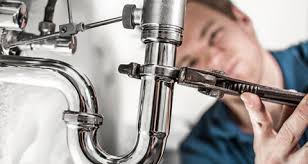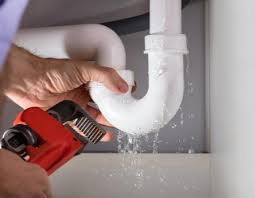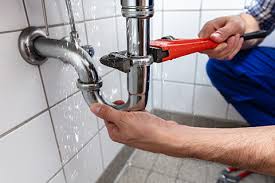Water leaks or broken pipes
It’s extremely necessary to know when all water shutoff valves in your home are located. You should at least know where the shutoff valves for appliances and utilities in the toilet, bathroom, kitchen, yard, and basement are located. Inspect where the shutoff valves for heating systems, water heaters, kitchen sink, tubs, toilet pipes, and other plumbing appliances are located.
You should also know where your home’s main water supply shutoff valve is located. It’s often located near the main water meter.
In case you’re unable to locate the shutoff valves and you have no idea about where to check, ask your local plumber about their location any time they’ll come to do plumbing repairs in your home.
Getting information about shutoff valves from an experienced plumber will give you more confidence if you’ll have to fix a plumbing emergency such as a broken pipe or water leak. You’ll surely feel good about yourself when you know what to do during an emergency. Although you’ll still have to call your plumber to fix the broken pipe or water leak, you should first control the water leakage to avoid flooding and costly damages to your property. Besides, you’ll have enough time to search for an ideal plumber and save the money you’d have spent hiring a costly emergency plumbing service.

WATER LEAK FROM A BROKEN PIPE UNDER HOUSE
Ever had floor tiles that come loose or lift suddenly for no reason? Dont wait until this issue becomes serious and your water bill increases rapidly.
Cracked sewer pipes can cause all sorts of issues both inside and out. Sometimes the only sign might be a slow drain flow or pavers lift up, however we all know the one where the toilet is blocked or an unpleasant sewer gas odour is wafting throughout the house.
So, what causes broken cracked or collapsed pipes? And how can you know the exact cause of the problem you are experiencing with your plumbing? Essentially, the following factors will cause issues in your sewer line:
- Aging – In most cases, sewer lines are designed to last for a couple of decades – typically between 40 to 60 years. Therefore, if you have older pipes, then there will be a high likelihood that they will crack, collapse, get broken, or separate on account of the many years they have been used.
- Roots – If you have trees in your yard, the roots might go deep and invade your plumbing pipes. This is one of the most common causes of cracked, broken and collapsed pipes especially in the suburbs where homes typically have large yards with trees.
- Poor Maintenance – Like with other aspects in your home, it is important that you get routine maintenance and management work done on your plumbing. This way, you will spot any problems and get them fixed before they become worse. If your sewer line, however, has not been maintained properly for a number of years, then it is likely that a small problem might cause cracks in your pipes. It might also break the pipes or collapse them.
- Human Factors – Sometimes, when utility companies perform work close to your home, their digging and moving of the earth might cause additional stress to your pipes and sewer system. This might cause breakage, cracking and collapsing of the pipes.
- Environmental Factors – In other instances, a number of environmental factors might cause the earth around your home to shift. This will put stress on your sewer lines, and cause your pipes to eventually collapse, break or crack.

Burst Pipe Repair: Your Emergency Guide
A burst pipe is an emergency situation and you must act as soon as possible to prevent extensive damage to your home.
It goes without saying that, if you need a burst pipe repair and you’re even a little unsure about carrying out the job yourself, you should call a qualified emergency plumber. However, before you pick up the phone, you will need to carry out burst pipe ‘first aid’.
Step 1 – Stop the flow
Turn off your water supply. Find the main stopcock and turn it off – this should be under your sink, or near the main entrance to your home. If you don’t know where the stopcock is, familiarise yourself with it now – when faced with a water emergency you won’t want to be hunting under the sink for it!
Step 2 – Drain the system
Remove water from the system by flushing all of your toilets and running the cold taps. Removing water from the system will help prevent further damage to your home and electrics before a burst pipe repair can be carried out. Switch off any water heating systems you have running, and once they are switched off, run the hot taps too.
Step 3 – Secure your electrics
If the burst pipe is leaking anywhere near any electrics or appliances, turn your electric off at the mains immediately. However, if the water is leaking on or near the mains switch, call an emergency eletrician straight away and do not attempt to switch it off yourself – if you do, you risk electrocution.
Step 4 – Contain any leaks
If your ceiling is bulging, you can attempt to drain the water by using a knife or a screwdriver to pierce the bulge and let the water out. However, you should only attempt this if you’re sure that it is safe to do so – if there is any chance the burst pipe could have damaged the structural integrity of a room, do not enter it until professionals have been called.
Step 5 – Arrange a burst pipe repair
Call a plumber to carry out your burst pipe repair. ACR Plumbing and Heating offer a wide range of plumbing services, and our convenient Dublin location places us in easy reach of all areas of the city – perfect if you need a burst pipe repair!

DIY Solutions for Broken Pipes
Before calling a plumber, there are certain fixes you can try to control a burst pipe. You should turn off the valve that connects to the burst pipe to prevent water loss and costly damages.
If you’re unable to find a dedicated shutoff valve to a specific pipe, then you’ll need to shut off your home’s main water supply.
Sometimes, turning off the water supply may not stop the water flow immediately. In this case, open all the cold water supply faucets to drain the entire plumbing system.
By following the above-mentioned tips, you’ll stand a better chance of controlling emergency plumbing problems resulting from leaking or broken pipes. Once you put the situation under control, contact your preferred plumber to fix the problem.
Water Supply System: Tips To Prevent Water Leaks
From high water pressure that stresses the system over time to old galvanized pipes that rust out, problems with your supply line pipe can cause huge damage.
What You Can Do
- Watch for warning signs. One or more of the following indicate you may have a supply line issue that warrants inspection by a plumbing professional: water spots on ceilings and floors; higher than normal water bills, which indicate excessive water usage; pipes that “bang” when faucets are turned off; and evidence of rust and wet soil erosion around the foundation.
- Make sure everyone in the home knows where the water supply valve is located and how to shut it off. Regularly test the valve to make sure it works properly.